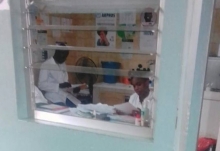Striking healthcare providers enter day two of a nationwide strike

The strike, which was called by the National Union of Hospital Practitioners of Togo (SYNPHOT), has become necessary after the Union’s last attempt on 24 January, when it embarked on a second sit-in strike, sending a last appeal to the government to call for deliberations or face a nationwide strike.
“The strike is being fully implemented across the entire country and we will take stock this evening on how things have turned out and then decide on the next major step,” SYNPHOT Secretary-General, Atchi Walla said.
Togo is known to have one of the worst health-care systems in West Africa. Access to services in public hospitals has become something like a lottery. Especially those who have neither health insurance nor cash at hand, they are doomed to die in this hazardous system.
Last week, workers at Togo’s foremost healthcare center, Sylvanus Olympio University Hospital, Lome, in the early working hours of two consecutive days, laid down their tools, gathered in front of the main administration area of the hospital and discussed issues surrounding their plight.
The health workers also used these periods to send passionate appeals to the government and all authorities in charge of healthcare provision in Togo to attend to their demands or face a complete shutdown of healthcare provision in the country.
It seems though, that those who were supposed to be listening refused to meet the workers on their demands, forcing them to completely lay down their tools.
The strike is meant to demand for basically better equipment for health provision as well as more nursing staff to support the work of healthcare providers across the country.
When PSI visited on 1 February the University Hospital in Lome, the walking alleys of the hospital were empty with no view in sight of either healthcare providers or patients who usually flood the hospital to have their sicknesses attended to.
A few ailing people, who were still seen around the premises of the hospital, are appealing that for the sake of their wellbeing, the authorities fully or partially meet the demands of the workers so that they do not die from neglect.
Already, primary and public-school teachers are on strike, demanding an increase in their wages, while students are protesting against a sharp rise in tuition fees.
The Sylvanus Olympio is Togo’s largest public hospital, but even its emergency rooms do not have first-aid equipment. The wards are in destitution. There are not enough beds, and the surgery rooms are underequipped.
There is also a shortage of health-care staff. Togolese doctors prefer to work abroad – in neighbouring countries, Europe and North America. In Togo, there is a lack of medical supplies for proper health provision. According to the CIA website, Togo only has 0.5 doctors per 1000 people. Wealthy European nations have three to four doctors per 1000 people.
Recently, Togo has been undergoing a series of protests by various sections of especially worker-unions in the country, calling for better services and remunerations as well as a call on the current government to relax its almost unperturbed approach to the many plights of its citizenry.
PSI affiliate, the Union of Hospital Practitioners of Togo (SYNPHOT) has among its members, workers from the CHU, CHR, CHP among others.
More information:

